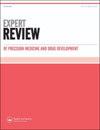Predictors of response for hepatocellular carcinoma immunotherapy: is there anything on the horizon?
IF 1.2
Q4 PHARMACOLOGY & PHARMACY
Expert Review of Precision Medicine and Drug Development
Pub Date : 2022-01-02
DOI:10.1080/23808993.2022.2075724
引用次数: 1
Abstract
ABSTRACT Introduction Hepatocellular carcinoma (HCC) remains an important cause of cancer-related death, representing the sixth most commonly diagnosed malignancy worldwide. Novel systemic treatment options have recently emerged for advanced diseases, including immune checkpoint inhibitors (ICIs), as monotherapy or in combination with other anticancer agents. However, several questions remain unanswered, including the identification of predictors of response to immunotherapy in this setting. Areas Covered Herein, we will provide a critical overview of current knowledge regarding predictive biomarkers of response to ICIs in HCC patients. A literature search was conducted in December 2021 of PubMed/Medline, Cochrane library, and Scopus databases. Expert Opinion Several critical issues regarding the role of ICIs in advanced HCC remain unsolved, with the identification of predictive biomarkers representing an unmet need. Further efforts aimed at identifying reliable predictors and the effective role of PD-L1 status, TMB, MSI, and other biomarkers are warranted.肝细胞癌免疫治疗反应的预测因素:有什么前景吗?
摘要简介肝细胞癌(HCC)仍然是导致癌症相关死亡的重要原因,是全球第六大最常见的恶性肿瘤。最近出现了针对晚期疾病的新的全身治疗选择,包括免疫检查点抑制剂(ICIs),作为单一疗法或与其他抗癌药物联合使用。然而,有几个问题仍未得到解答,包括在这种情况下确定免疫疗法反应的预测因素。本文涵盖的领域,我们将对HCC患者对ICIs反应的预测性生物标志物的当前知识进行批判性概述。2021年12月,对PubMed/Medline、Cochrane图书馆和Scopus数据库进行了文献检索。专家意见关于ICIs在晚期HCC中的作用的几个关键问题仍未解决,预测性生物标志物的鉴定代表了未满足的需求。需要进一步努力,以确定PD-L1状态、TMB、MSI和其他生物标志物的可靠预测因素和有效作用。
本文章由计算机程序翻译,如有差异,请以英文原文为准。
求助全文
约1分钟内获得全文
求助全文
来源期刊

Expert Review of Precision Medicine and Drug Development
PHARMACOLOGY & PHARMACY-
CiteScore
2.30
自引率
0.00%
发文量
9
期刊介绍:
Expert Review of Precision Medicine and Drug Development publishes primarily review articles covering the development and clinical application of medicine to be used in a personalized therapy setting; in addition, the journal also publishes original research and commentary-style articles. In an era where medicine is recognizing that a one-size-fits-all approach is not always appropriate, it has become necessary to identify patients responsive to treatments and treat patient populations using a tailored approach. Areas covered include: Development and application of drugs targeted to specific genotypes and populations, as well as advanced diagnostic technologies and significant biomarkers that aid in this. Clinical trials and case studies within personalized therapy and drug development. Screening, prediction and prevention of disease, prediction of adverse events, treatment monitoring, effects of metabolomics and microbiomics on treatment. Secondary population research, genome-wide association studies, disease–gene association studies, personal genome technologies. Ethical and cost–benefit issues, the impact to healthcare and business infrastructure, and regulatory issues.
 求助内容:
求助内容: 应助结果提醒方式:
应助结果提醒方式:


